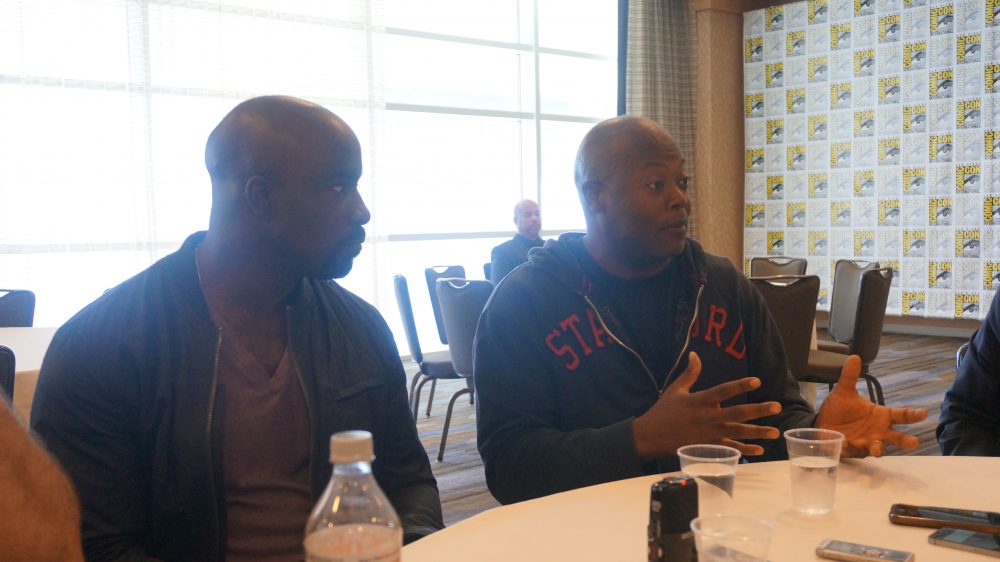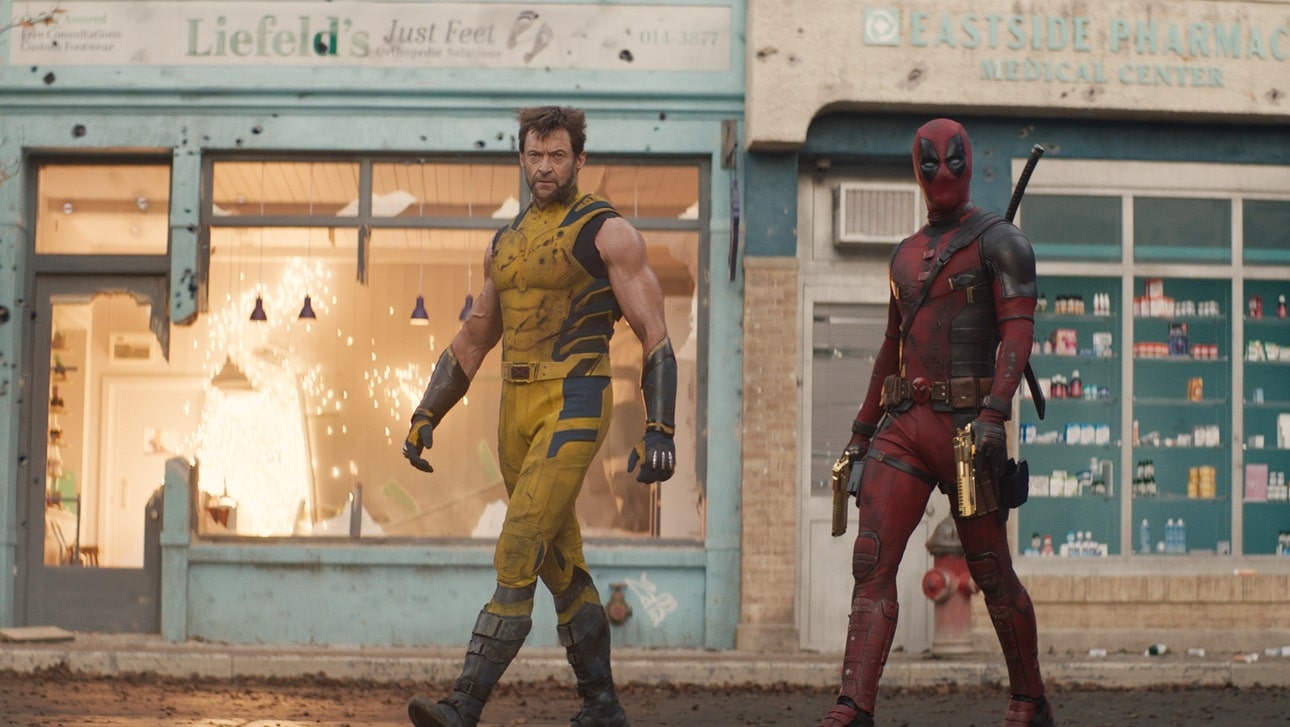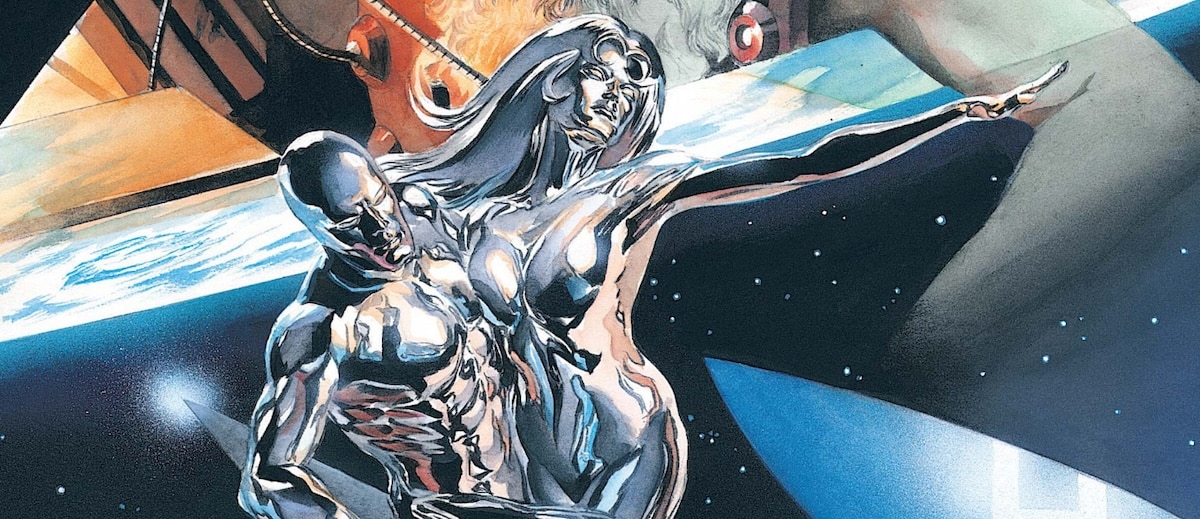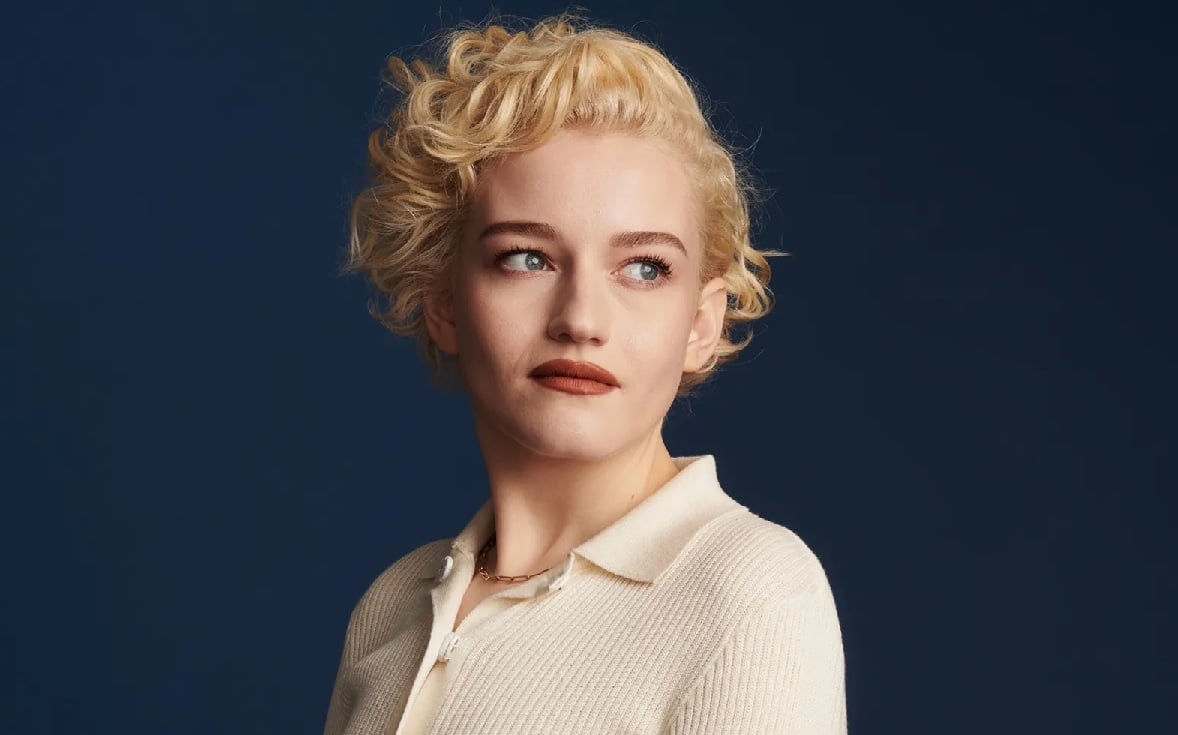The latest in a line of critically successful commercial hits for Marvel Television and Netflix, Luke Cage brings Mike Colter’s invincible Defender-in-the making to the forefront in his own series that sees him trying to rebuild his life in modern day Harlem, particularly after the explosive events of Jessica Jones. But trouble finds him soon enough, and he’ll have to confront his own past, while also battling for the heart of the city.
At SDCC today, The Beat had a chance to chat with the cast of this upcoming series, including star Mike Colter, showrunner Cheo Hodari Coker, Mahershala Ali (Cornell Stokes), Alfre Woodard (Mariah Dillard), Theo Rossi (Shades), Simone Missick (Misty Knight), Frank Whaley (Rafael Scarfe), as well as head of Marvel television Jeph Loeb.
In talking to Ali and Woodard, we got a better sense of the series’ villains and just how important the setting of Harlem is to them as characters, individuals and within the themes of the series. Conversely, our discussion with Simone Missick centered on her audition process for the series and the secrecy surrounding her involvement (for example, she was advised by Loeb to not go and buy any comics featuring Misty Knight for fear of being photographed with them).
But my favorite roundtable discussion was when we were joined by showrunner and series creator Coker along with Colter, the title star himself. Below are their comments, transcribed mostly in full. They initially began discussing how they see Luke Cage currently in the status quo of the series:
Colter: (Luke is) a guy that has been thrust into a place that he doesn’t really want to be. He’s a guy that’s been endowed with abilities, and to him it’s not a positive, at least he doesn’t see it that way. He’s reluctant, and he tries to shy away from the spotlight. He’s a humble guy and he doesn’t want any part of this. But ultimately, it’s something he’s going to have to deal with. So when I look at it, it’s perfect for me because I don’t really like the spotlight either, and with him, it feels like a glove.
Coker: He’s a complicated man, who no one understands but his woman. His woman in this case, Riva, happens to be dead. He basically deals with that, he deals with…
Colter: She was the only one he could talk to.
Coker: He has very few people he could talk to. And so he wants to kind of lay in the cut, he never wanted his powers, he didn’t ask for them and now that he has them, he doesn’t necessarily want the spotlight and heat that comes from being different. But when things go out of control, and actually it’s interesting, things that could have been in control if he had kept certain things from happening, there’s consequences for not doing what he should have done in the first place…he feels a responsibility to come out of the shadows and to be a hero.
Part of what the first season is about is how does one accept the mantle of being a hero? There’s a pivotal line in the first episode, “I’m not for hire, man, but I’ve got to”. Yes, we’re playing with the fact that everyone knows he’s a hero for hire, but for season one, let’s look at what does it mean to be a hero, what are the sacrifices that come from that, and how does one get to the point where you finally accept who you are?
One of the bigger questions that floated through my mind at the announcement of this series is how Coker would tackle this material given that there isn’t really a “go-to” Luke Cage comics tale akin to what provided the backbone for both seasons for Daredevil and the first round of episodes of Jessica Jones. Coker addressed this as well:
Coker: Daredevil is haunted by Frank Miller, from the standpoint of…it’s so insurmountable and the only thing you can really do is match it. Brian Michael Bendis’ Alias and what he was able to do with Jessica Jones, it’s like, that comic and the level of maturity and deep themes of that comic, translate perfectly into the series. But Luke Cage – there’s the Power Man and Iron Fist comics that I remember growing up, but the tone was never really that deep or heavy.
It was basically like, every single issue, there was Cottonmouth, or Big Ben and all these different people. So really, at first I thought that was a disadvantage, but that turned out it was a great advantage for our show, because it really allowed us to…there’s been 30-40 years where people haven’t really explored these characters, so we could reinterpret them. We could do it in such a way that definitely respected the spirit of the original comics from the 70’s and all the different generations, but at the same time, as a show, existed in its own space.
What I think happens is that, because they’re different, people will go back to the comics and experience that richness in one way, and they’ll also give our show its own sense of whatever it is.
One of the fascinating aspects of the series is that it leans heavily into race, much in the same way that Jessica Jones leans into feminist thought, even to the degree that the “n-word” is used. One of the reporters from our roundtable posed the question of difficulty related to the usage of that word in the context of a Marvel series:
Coker: They had some trepidation, I’m not gonna front. My whole thing is that, in using this word, I didn’t want it to be comfortable. I wanted every single time that it’s heard that people think about it. But I also wanted the show to live on its own terms, from the standpoint of: this is what it’s like when you eavesdrop on black people talking to each other. That at times will come up in certain ways, and so I basically wanted to explore the context in which it was used, as Cottonmouth uses the word differently.
I wanted it to be like people would think about it who have never thought about it before. And at the same time, it’s like – come on, every Blaxploitation movie from Shaft to Hell Up in Harlem to Black Caesar deals with power and deals with these issues and it needed to feel like that to.
Colter: Speaking of that, we talked about that early on, and I was adamant that Luke was not a person that used that language. He was not a person that used that word because he was bigger than that. And I said, first and foremost, we’ve got to define this superhero beyond just his powers, because he needs to be someone we can aspire to be.
I felt like if he was the kind of guy that used that language all the time, or if he was someone on the street corner that didn’t respect himself or someone around him, then in a sense, he had lost already or had given up. So that was a high requirement. In this day and age, even as a black man, if you don’t want to use that word, if you choose to not use that word, you’re walking a path on your own almost because it’s so accepted. So Luke, he wanted to be better than that, from the books he read… he’s trying to better himself, he’s trying to change his path. So when he does use it, I think it resonates and it’s out of frustration.
Coker: And that’s the thing, you always get the question: “What makes Luke Cage different than any other character?” He’s black.
Let’s face it, there aren’t a lot of black superheroes, and so in dealing with a black superhero you’re going to deal with ugly history and the beauty of history and it’s sort of like, yes, he’s going to have different responsibilities and different issues than say Captain America would have to deal with. But then again, he’s going to have to deal with things that every superhero has to deal with. At the same time he has super-human abilities, we want to also emphasize on the human and the frailty of personality and the temptations and everything else that comes with being a person. That’s the one thing about this show, is that everybody, from the villains to our heroes had to have these moments of doubt, have these moments of reflection and clarity.
Another area of interest for me was how Colter found the transition from Jessica Jones showrunner, Melissa Rosenberg, to Coker, given that the character originated with the former:
Colter: It’s interesting, because I look at it from the stand-point of being directed by a different director every episode, as an actor, there is something that people bring to the interpretation. And so, the showrunner for Cage is obviously a black man, and the Jessica Jones showrunner is a white female. The point of view of Jessica Jones was told from the point of view of Jessica, and so Cage existed through her point of view. It’s her viewpoint through how we experience him, how he interacts with her…and so when you examine him closely, we are doing it under the leadership of a black male who is now the showrunner, examining this character; the same character just turning up the volume in certain colors and certain flavors.
He’s in Harlem now. We all act differently in certain places. We don’t want to admit it, but when we go home, we’re different than where we grew up, than where we are with our family, than the guys we went to college with. People just exist differently, but we do this because we are all the same, just with different colors coming out.
Coker: First off, I thank Melissa every day, every time I run into her, for casting Mike. Because she cast the perfect Luke Cage, and what’s great about Mike is not just that he looks literally like the character as he was drawn. At the same time he also has a sensitivity, and that was the one thing, yes, we were going to have the brawn and yes, we were going to have the grit of Luke Cage, but we also had somebody that could embody that sensitivity of conversation, of personality. That’s the thing, even though my approach to this is slightly different, the Luke Cage of Jessica Jones is no stranger to the Luke Cage of Marvel’s Luke Cage. It’s really a continuation to a certain extent. It’s a little different flavor, but it’s still the same soup.
Luke Cage debuts on Netflix on September 30.








I am really sick of folks reminding everyone that ‘there aren’t a lot of black superheroes’ as Mr. Coker said in this interview. He’s right, there haven’t been a lot historically but now, times are a changin’. Why not, instead of talking about the past when attitudes were veerrrry different, you look to the present and the future and give credit where credit is due.
CAPTAIN AMERICA; CIVIL WAR had three black superheroes. So things are changing. I’d rather focus on a positive future than an ugly history.
Comments are closed.